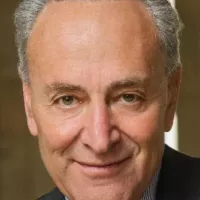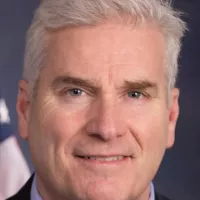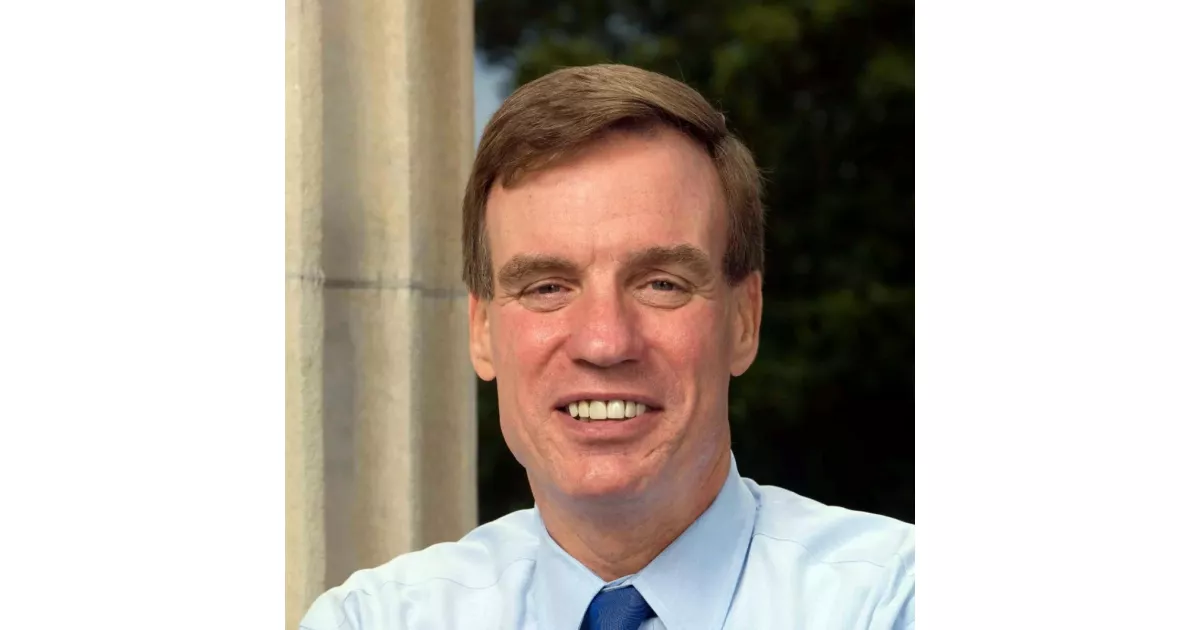Mark Warner is an American politician and businessman who has served as a United States Senator from Virginia since 2009. A member of the Democratic Party, he previously served as the 69th Governor of Virginia from 2002 to 2006. Currently, he holds the position of Vice Chair of the Senate Democratic Caucus and Vice Chair of the Senate Intelligence Committee.
December 15, 1954: Mark Warner's Birth
On December 15, 1954, Mark Robert Warner was born in the United States.
1968: Inspired by social studies teacher
In 1968, Mark Warner credited his eighth-grade social studies teacher, Jim Tyler, for inspiring him to work for social and political change.
1970: Harry Byrd, Jr. leaves Democrats
In 1970, Harry Byrd, Jr. left the Democrats to become an independent.
1974: Reference to Pension Plan of 1974
In January 2019, Mark Warner was one of six Democratic senators to introduce the American Miners Act of 2019, aimed at amending the Surface Mining Control and Reclamation Act of 1977 to bolster the 1974 Pension Plan and prevent its insolvency.
1976: Supreme Court reinstated capital punishment
In 1976, the Supreme Court reinstated capital punishment as permissible under the Eighth Amendment to the Constitution.
1977: Warner graduates from George Washington University
In 1977, Mark Warner graduated from George Washington University with a bachelor's degree in political science.
1977: Reference to Surface Mining Control and Reclamation Act of 1977
In January 2019, Mark Warner was one of six Democratic senators to introduce the American Miners Act of 2019, aimed at amending the Surface Mining Control and Reclamation Act of 1977 to bolster the 1974 Pension Plan and prevent its insolvency.
1980: Warner graduates from Harvard Law School and raises money for the Democratic Party
In 1980, Mark Warner graduated from Harvard Law School with a Juris Doctor and started raising money for the Democratic Party based in Atlanta.
1981: Roger Keith Coleman Convicted
In 1981, Roger Keith Coleman was convicted in the rape and stabbing death of Wanda McCoy.
1982: Warner ceases raising money for Democratic Party
In 1982, Mark Warner stopped raising money for the Democratic Party.
1989: Warner co-founded Capital Cellular Corporation
In 1989, Mark Warner co-founded Capital Cellular Corporation.
1989: Warner managed Douglas Wilder's gubernatorial campaign
In 1989, Mark Warner managed Douglas Wilder's successful gubernatorial campaign.
1989: Illness during honeymoon
In 1989, while on his honeymoon in Egypt and Greece, Mark Warner became severely ill due to a burst appendix and spent two months in the hospital recovering.
1992: Roger Keith Coleman was put to death
In 1992, Roger Keith Coleman, who was convicted in the 1981 rape and stabbing death of his 19-year-old sister-in-law, Wanda McCoy, was put to death by the state
1993: Warner becomes Chairman of the state Democratic Party
In 1993, Mark Warner became chairman of the state Democratic Party.
1995: Warner inducted into Omicron Delta Kappa
In 1995, Mark Warner was initiated into Omicron Delta Kappa, the National Leadership Honor Society, as an alumni member by GWU.
1995: End of Warner's term as Chairman of the state Democratic Party
In 1995, Mark Warner's term as chairman of the state Democratic Party came to an end.
1996: Warner unsuccessfully ran for U.S. Senate
In 1996, Mark Warner unsuccessfully ran for the U.S. Senate against incumbent Republican John Warner.
1999: Robin Lovitt convicted of murder
In 1999, Robin Lovitt was convicted of murdering Clayton Dicks at an Arlington pool hall.
2001: Lovitt's Trial
After Robin Lovitt's trial in 2001, his lawyers stated that a court clerk illegally destroyed evidence.
2001: Warner campaigns for governor
In 2001, Mark Warner campaigned for governor as a moderate Democrat, building up a power base in rural Virginia.
2002: Warner uses 'rainy day fund'
After being elected in 2002, Warner drew upon a $900 million "rainy day fund" left by his predecessor, Jim Gilmore. He also campaigned for regional sales tax increases to fund transportation, but these were rejected by Virginians.
2002: Warner becomes Governor of Virginia
In 2002, Mark Warner assumed the role of the 69th Governor of Virginia.
2003: Warner influences college athletics
In 2003, Governor Mark Warner pressured the Atlantic Coast Conference to revoke an invitation to Syracuse University in favor of Virginia Tech.
2003: Democrats gain seats in Virginia House of Delegates
In 2003, Mark Warner's popularity may have helped Democrats gain seats in the Virginia House of Delegates.
2004: Warner chairs the National Governors Association
In 2004, Mark Warner chaired the National Governors Association.
2004: Warner reforms tax code
In 2004, Mark Warner collaborated with legislators and the business community to reform the tax code, decreasing taxes on food and some income while increasing sales and cigarette taxes, leading to a net tax increase of $1.5 billion annually.
January 2005: Virginia rated one of the best-managed states
In January 2005, the Government Performance Project rated Virginia as one of the best-managed states in the nation, earning an A− overall.
July 2005: Warner's high approval ratings
In July 2005, Mark Warner's approval ratings were at 74%, reaching 80% in some polls.
November 29, 2005: Warner commutes death sentence of Robin Lovitt
On November 29, 2005, Governor Mark Warner commuted the death sentence of Robin Lovitt to life imprisonment without parole due to concerns about destroyed evidence.
January 12, 2006: DNA confirms Coleman's guilt
On January 12, 2006, DNA results confirmed Roger Keith Coleman's guilt in the 1981 rape and stabbing death of Wanda McCoy.
October 2006: Warner declines to run for President
In October 2006, Mark Warner announced he would not pursue the Democratic nomination for the 2008 U.S. presidential election to avoid disrupting his family life.
October 2006: Warner declines presidential run
In October 2006, Mark Warner announced that he would not run for president, citing family reasons.
2006: End of Warner's term as Governor
In 2006, Mark Warner concluded his service as the 69th Governor of Virginia.
September 13, 2007: Warner announces Senate run
On September 13, 2007, Mark Warner announced his candidacy for the U.S. Senate seat being vacated by John Warner.
September 24, 2008: Warner holds lead over Gilmore
On September 24, 2008, Mark Warner held a 30-point lead over Jim Gilmore in a Washington Post/ABC News poll.
2008: Top campaign contributors
From 2008, Mark Warner's top ten campaign contributors included JP Morgan Chase, the Blackstone Group, and Columbia Capital.
2008: Warner delivers Keynote Address and declines VP nomination
In 2008, Mark Warner delivered the keynote address at the Democratic National Convention and later withdrew himself from consideration as a potential vice presidential candidate after securing the Democratic nomination for the U.S. Senate.
2008: Warner delivers keynote address
In 2008, Mark Warner delivered the keynote address at the Democratic National Convention.
2008: Warner preparing to run for President
In 2008, Mark Warner was believed to be preparing to run for the Democratic nomination for president before suddenly announcing in October 2006 he would not run for president, citing family reasons.
2008: Warner elected to the Senate
In 2008, Mark Warner was elected to the U.S. Senate.
2008: Reference to 2008 financial crisis
In January 2019, Mark Warner was one of six Democratic senators to introduce the American Miners Act of 2019, which was created to help prevent its insolvency as a result of coal company bankruptcies and the 2008 financial crisis.
2009: Warner becomes Senator from Virginia
In 2009, Mark Warner assumed the role of senior United States Senator from Virginia.
2009: Warner votes for American Recovery and Reinvestment Act
In 2009, Mark Warner voted for the American Recovery and Reinvestment Act and submitted an amendment to track stimulus spending.
2009: Appointed chair of bipartisan task force on government performance
In 2009, Mark Warner was appointed chair of a bipartisan task force on government performance on the Senate Budget Committee.
2009: Warner appointed to Senate committees
In 2009, Mark Warner was appointed to the Senate's Banking, Budget, and Commerce committees.
2010: Warner leads Senate's Gang of Six
Between 2010 and 2013, Mark Warner invested considerable time and effort in leading the Senate's Gang of Six, along with Saxby Chambliss.
2010: Warner works on Dodd-Frank Act
In 2010, Mark Warner collaborated with Republican Bob Corker on the Banking Committee to draft a key section of the Dodd-Frank Act, aimed at preventing taxpayer bailouts of failing Wall Street financial firms.
2010: Warner votes for Affordable Care Act
In 2010, Mark Warner voted for the Affordable Care Act (ACA), also known as Obamacare, and discussed adding an amendment package focused on health IT and wellness prevention to address healthcare costs.
2010: Lead sponsor of the Government Performance and Results Act
In 2010, Mark Warner was a lead sponsor of the Government Performance and Results Act (GPRA), which aimed to improve program performance across federal agencies.
2010: Warner requests Commission on Humanities and Social Sciences
In 2010, Mark Warner, along with others, requested that the American Academy of Arts and Sciences form The Commission on the Humanities and Social Sciences.
2011: Warner receives Economic Patriots Award
In 2011, Mark Warner and Saxby Chambliss received the Economic Patriots Award from the bipartisan Concord Coalition for their work with the Gang of Six.
2011: Warner buys shares in BlackRock Equity Dividend Fund
In 2011, Mark Warner bought shares in the BlackRock Equity Dividend Fund. Prior to this, BlackRock had not contributed to his campaigns.
2011: Warner votes for USA PATRIOT Act extension and engages in pro bono effort
In 2011, Mark Warner voted for the four-year extension of the USA PATRIOT Act and engaged Northern Virginia's high-tech community in a pro bono effort to correct burial mistakes at Arlington National Cemetery.
2011: Warner appointed to Senate Intelligence Committee
In 2011, Mark Warner was appointed to the Senate Intelligence Committee.
2011: Warner co-sponsors Startup Act
In 2011, Mark Warner was the original Democratic sponsor of the Startup Act legislation and partnered with Jerry Moran.
November 2012: Warner decides to remain in the Senate
In November 2012, Mark Warner announced he would remain in the Senate after considering a run for Virginia governor, citing his commitment to finding bipartisan solutions to the nation's fiscal challenges.
2012: Warner addresses federal retirement backlogs and expands PTSD treatment access
In 2012, Mark Warner addressed retirement benefit backlogs for federal workers and expanded access to PTSD treatment for female military veterans returning from Iraq and Afghanistan.
2012: Warner declines to chair DSCC
In 2012, Mark Warner declined the chair of the Democratic Senatorial Campaign Committee to avoid partisanship.
2012: Warner co-sponsors Startup Act 2.0
In 2012, Mark Warner partnered with Jerry Moran to introduce Startup Act 2.0.
2012: Warner pushes Navy to improve military housing
In 2012, Mark Warner successfully pushed the Navy to improve substandard military housing in Hampton Roads.
March 2013: Announced support for same-sex marriage
In March 2013, Mark Warner publicly announced his support for same-sex marriage in a statement on his Facebook page.
April 17, 2013: Voted to expand background checks for gun purchases
On April 17, 2013, Mark Warner voted in favor of expanding background checks for gun purchases as part of the Manchin-Toomey Amendment.
May 21, 2013: Introduced the Digital Accountability and Transparency Act of 2014
On May 21, 2013, Mark Warner introduced the Digital Accountability and Transparency Act of 2014 (DATA) to standardize federal spending reporting.
August 2013: Warner warns against predatory lending to service members
In August 2013, Mark Warner was one of 23 Democratic senators to sign a letter to the Defense Department, warning against predatory lending practices targeting service members and their families.
November 6, 2013: Senate committee passed DATA
On November 6, 2013, the Senate Homeland Security and Government Affairs committee unanimously passed the Digital Accountability and Transparency Act (DATA).
2013: Warner leads Senate's Gang of Six
Between 2010 and 2013, Mark Warner invested considerable time and effort in leading the Senate's Gang of Six, along with Saxby Chambliss.
2013: Warner receives Publius Award
In 2013, Mark Warner and Bob Corker received the Publius Award from the Center for the Study of the Presidency and Congress for their bipartisan efforts on financial reform legislation.
2013: Warner becomes Virginia's senior senator
In 2013, Mark Warner became Virginia's senior senator after Jim Webb retired.
2013: Warner inducted into Wireless Hall of Fame
In 2013, Mark Warner's dedication to the telecommunications industry was recognized as he was inducted into the Wireless Hall of Fame.
2013: Warner co-sponsors Startup Act 3.0
In early 2013, Mark Warner partnered with Jerry Moran to introduce Startup Act 3.0.
January 27, 2014: Responded to OMB's version of the DATA Act
On January 27, 2014, Mark Warner responded to the White House Office of Management and Budget's (OMB) marked-up version of the Digital Accountability and Transparency Act (DATA), expressing concerns about proposed changes.
April 10, 2014: Senate passed the Digital Accountability and Transparency Act
On April 10, 2014, the Senate voted by unanimous consent to pass the Digital Accountability and Transparency Act.
April 2014: Senate debated the Minimum Wage Fairness Act
In April 2014, the Senate debated the Minimum Wage Fairness Act (S. 1737; 113th Congress). Warner expressed a willingness to negotiate with Republicans about some of the provisions of the bill.
April 28, 2014: House passed the Digital Accountability and Transparency Act
On April 28, 2014, the House passed the Digital Accountability and Transparency Act in a voice vote.
October 2014: Warner implicated in Phillip Puckett investigation
In October 2014, Mark Warner was implicated in a federal investigation regarding the resignation of Virginia State Senator Phillip Puckett, facing allegations of discussing job possibilities for Puckett's daughter to influence his decision.
2014: Campaign contributions
From 2008 to 2014, Mark Warner's top ten campaign contributors included JP Morgan Chase, the Blackstone Group, and Columbia Capital.
2014: Introduced the Digital Accountability and Transparency Act
In 2014, Mark Warner introduced the Digital Accountability and Transparency Act.
2014: Warner narrowly reelected to Senate
In 2014, Mark Warner was narrowly reelected to the Senate, defeating Ed Gillespie by only 17,000 votes.
2014: Warner reelected to the Senate
In 2014, Mark Warner was reelected to the U.S. Senate.
January 2015: Formal complaint filed against Warner
In January 2015, the Republican Party of Virginia filed a formal ethics complaint against Mark Warner with the United States Senate Select Committee on Ethics, alleging violations of the Honest Leadership and Open Government Act due to his interactions with Phillip Puckett.
July 2015: Cosponsored the Equality Act
In July 2015, Mark Warner and Tim Kaine cosponsored the Equality Act along with 38 other senators and 158 members of the House of Representatives, aiming to prohibit discrimination in housing, education, and the workplace.
2015: Warner criticizes Saudi-led intervention in Yemen
In 2015, Mark Warner criticized the Saudi Arabian-led intervention in Yemen, expressing concern about indiscriminate bombing and urging Gulf states to be more focused.
September 2016: Warner signs letter urging veto of resolution against Israel
In September 2016, Mark Warner signed an AIPAC-sponsored letter urging President Obama to veto "one-sided" resolutions against Israel in advance of UN Security Council resolution 2334.
2016: Reference to Trump's 2016 presidential campaign
In May 2018, Mark Warner warned Republican lawmakers that it would be "potentially illegal" to reveal the identity of Stefan Halper, an FBI operative who contacted members of Trump's 2016 presidential campaign.
June 2017: Warner supports arms deal with Saudi Arabia
In June 2017, Mark Warner voted in support of President Trump's $350 billion arms deal with Saudi Arabia.
July 2017: Warner votes for Countering America's Adversaries Through Sanctions Act
In July 2017, Mark Warner voted for the Countering America's Adversaries Through Sanctions Act, which included sanctions against Iran, Russia, and North Korea.
December 2017: Warner criticizes Jerusalem recognition
In December 2017, Mark Warner criticized Donald Trump's decision to recognize Jerusalem as the capital of Israel, stating that it "comes at the wrong time and unnecessarily inflames the region."
2017: Expressed support for Second Amendment rights
In 2017, Mark Warner stated he was a strong supporter of Second Amendment rights and would advocate for responsible gun ownership for hunting, recreation, and self-defense.
May 2018: Warner votes for Gina Haspel as CIA director
In May 2018, Mark Warner voted in favor of Gina Haspel's confirmation as the next CIA director.
May 2018: Warner warns against revealing Halper's identity
In May 2018, Mark Warner warned Republican lawmakers that it would be "potentially illegal" to reveal the identity of Stefan Halper, an FBI operative who contacted members of Trump's 2016 presidential campaign.
December 2018: Warner calls Huawei a threat
In December 2018, Mark Warner identified Chinese telecommunications giant Huawei as a threat to U.S. national security.
2018: Changed position on Assault Weapons Ban
In 2018, Mark Warner changed his position on the 2013 Assault Weapons Ban in an op-ed and co-sponsored similar efforts.
2018: Warner supports easing banking regulations
In 2018, Mark Warner was among a minority of Senate Democrats supporting a bill to ease "key banking regulations", arguing that it would "right-size post-crisis rules imposed on small and regional lenders and help make it easier for them to provide credit".
2018: Estimated net worth of $215 million
In 2018, Mark Warner's estimated net worth was $215 million.
2018: Reference to Fiscal Year 2018 national security funding
In April 2019, Mark Warner was among 34 senators who signed a letter to President Trump, urging him to reverse his decision to cut aid to Central America and use the Fiscal Year 2018 national security funding, arguing it would damage national security.
2018: Reference to 2018 coal company bankruptcies
In January 2019, Mark Warner was one of six Democratic senators to introduce the American Miners Act of 2019, ensuring that miners affected by the 2018 coal company bankruptcies would not lose their health care.
January 2019: Introduced Background Check Expansion Act
In January 2019, Mark Warner was among 40 senators who introduced the Background Check Expansion Act, which aimed to require background checks for all firearms sales, including those by unlicensed sellers.
January 2019: Warner introduces the American Miners Act of 2019
In January 2019, Mark Warner was one of six Democratic senators to introduce the American Miners Act of 2019, aimed at amending the Surface Mining Control and Reclamation Act of 1977 to bolster the 1974 Pension Plan and prevent its insolvency.
February 2019: Warner signs letter on electricity infrastructure security
In February 2019, Mark Warner was among 11 senators who signed a letter to Energy Secretary Rick Perry and Homeland Security Secretary Kirstjen Nielsen, urging them to secure the nation's critical electricity infrastructure.
April 2019: Warner signs letter to Trump on Central America funding
In April 2019, Mark Warner was among 34 senators who signed a letter to President Trump, urging him to reverse his decision to cut aid to Central America and use the Fiscal Year 2018 national security funding, arguing it would damage national security.
June 2019: Warner introduces PAID AD Act
In June 2019, Mark Warner and Amy Klobuchar introduced the Preventing Adversaries Internationally from Disbursing Advertising Dollars (PAID AD) Act, aiming to modify U.S. federal campaign finance laws to prohibit foreign nationals from purchasing political ads on platforms during election years.
July 2019: Warner cosponsors Defending America's 5G Future Act
In July 2019, Mark Warner cosponsored the Defending America's 5G Future Act, which aimed to prevent Huawei from being removed from the Commerce Department's "entity list" and authorize Congress to block administration waivers for U.S. companies to do business with Huawei.
September 2019: Warner advocates for coal miner benefits
In September 2019, amid government shutdown discussions, Mark Warner joined five other Democratic senators in signing a letter to congressional leadership, advocating for legislation to permanently fund health care and pension benefits for retired coal miners.
May 13, 2020: Warner votes against Lee-Leahy FISA amendment
On May 13, 2020, Mark Warner and Joe Manchin were the only two Democratic senators to vote against the Lee-Leahy FISA amendment, which aimed to strengthen oversight of counterintelligence activities.
2020: Warner defeats Daniel Gade
In 2020, Mark Warner defeated Republican nominee Daniel Gade in the Senate election.
2020: Warner reelected to the Senate
In 2020, Mark Warner was reelected to the U.S. Senate.
March 2023: Warner introduces RESTRICT Act
In March 2023, Mark Warner and John Thune introduced the Restricting the Emergence of Security Threats that Risk Information and Communications Technology (RESTRICT) Act, which gives the federal government more control over foreign technology by empowering the Department of Commerce to review, prevent, and mitigate information communications and technology transactions that pose undue risk to our national security.
January 2025: Warner co-sponsors the Kids Off Social Media Act
In January 2025, Mark Warner co-sponsored the Kids Off Social Media Act (KOSMA), which would set a minimum age of 13 to use social media platforms and prevent social media companies from feeding "algorithmically targeted" content to users under 17.
2025: Warner second wealthiest senator
As of 2025, Mark Warner is the second wealthiest U.S. senator.
2025: Voted for the Laken Riley Act
In 2025, Mark Warner was one of 12 Senate Democrats who joined all Republicans to vote for the Laken Riley Act.
Mentioned in this timeline
Huawei is a Chinese multinational technology corporation headquartered in Shenzhen...

Basketball is a team sport played on a rectangular court...

Donald John Trump is an American politician media personality and...

Chuck Schumer is the senior United States Senator from New...
Facebook is a social media and networking service created in...

Elizabeth Warren is a prominent American politician and the senior...
Trending

12 minutes ago Tom Emmer, Minnesota Immigration, Operation Metro Surge: Praise and Fears in Twin Cities

12 minutes ago DiZoglio faces Audit Obstacles: Judge and AG resist, legislature involved in Massachusetts fight.

12 minutes ago Similarities and Differences: Trump vs. Washington, Importance of Washington's Farewell Address Today

13 minutes ago Stephanie Pratt Publicly Criticizes Brother Spencer's LA Mayoral Campaign, Calls it 'Stupidity'
1 hour ago Joe Hendry shines in NXT, eyes dream match with Drew McIntyre in Scotland.
1 hour ago Leylah Fernandez triumphs in Dubai, upsetting Samsonova in thrilling comeback victory.
Popular

Kid Rock born Robert James Ritchie is an American musician...
Randall Adam Fine is an American politician a Republican who...

Pam Bondi is an American attorney lobbyist and politician currently...

Barack Obama the th U S President - was the...
The Winter Olympic Games a major international multi-sport event held...

XXXTentacion born Jahseh Dwayne Ricardo Onfroy was a controversial yet...
